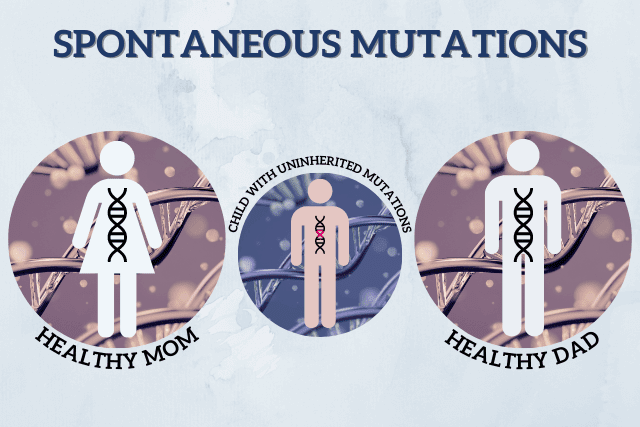Autism is a condition that can appear in any child, even without a history of it in the family. Since there's no cure, managing autism involves therapies and other strategies. The genetics of autism are complex – it's not caused by a single gene from the parents but is likely due to changes in multiple genes. A common concern among parents is whether they could pass on genes associated with autism to their children. Given the complex nature of autism's genetics, providing a clear answer to this question is challenging. This article explores the current understanding of how autism genes are inherited and what this means for parents.
What Is Autism?
Autism is a developmental condition that affects communication and social interaction.
Some people with autism exhibit symptoms like difficulty in verbal and nonverbal communication, repetitive behaviors, and low social interaction skills.
People with autism experience challenges in everyday life, including finding employment, interacting with others, and accessing community resources.
It is still unclear why some people develop autism and others do not, but researchers are exploring all possible causes.
Is Autism Genetic?
Although a single gene does not cause autism, there is evidence that genetics play a role in the development of the disorder.
Studies have found that people with autism are more likely to have relatives who also have autism and that the risk of developing autism increases with the number of relatives who have the disorder.
Studies have found that some people with autism have a higher-than-average number of genetic markers associated with the disorder.
However, there is still much to learn about the genetics of autism and how it contributes to the development of the disorder.
Which Parent Carries The Autism Gene?
Due to its lower prevalence in females, autism was always thought to have a maternal inheritance component.
However, emerging research suggests this is not true.
While there's some weak evidence that points towards the rarer autism-associated variants being inherited from the father, no follow-up studies have been able to back this.
In fact, most studies done on the genetics and inheritance of autism suggest that autism can be inherited from either biological parent, and their sex at birth doesn't determine the chances.
Ultimately, autism is a complex condition with 100s of genes involved.
In a child with autism, it is very challenging to tease apart maternal and paternal genetic contributions.
Even without a family history of mental disorders, autism can occur in a child due to spontaneous mutations.
Genetic tests can help understand the risk for autism, explain the possible causes, and shine a light on optimal management and treatment options.
Is Autism Inherited from Mother or Father?
In almost 50% of the cases where there’s only one child in the family with autism, the cause appears to be spontaneous mutations.
Spontaneous mutations are genetic mutations that are absent in the parents and siblings of affected children.

Image: Spontaneous mutations
Researchers have long noted that parents of autistic children display some of the traits seen in their children in a much more muted manner.
A 2020 study examined the role of familial relationships in explaining similarities in behaviors across family members.
The study found a relationship between parents and children's behavioral traits, maternal polygenic scores, and broad autism behavior traits in children.
This means that traits in children with autism may take after the mother's subtle autism-like behaviors.
For example, if a mother has issues communicating in a social setting, then her autistic child may have communication difficulties themselves.
On the other hand, a large study based on the analysis of 9,275 whole genomes suggests that fathers may pass down some mutations tied to autism.
The study focused on flanking gene regions where mutations are rare.
The researchers reported that fathers pass down such rare variants twice as much as mothers.
Does Autism Run in Families?/Is Autism Hereditary?
Studies have shown that autism is predominantly a genetic disorder, with 40-80% heritability.
Researchers are still working to identify all of the genes associated with autism.
However, they do know that some genetic mutations can increase your risk of developing autism.
If you have a family member with autism, you should consider talking to your doctor about getting screened for genetic mutations that could put you at higher risk.
Children in families with a history of other mental conditions are also at a higher risk for developing autism
These can include ADHD, schizophrenia, and bipolar disorder.
According to an article on Spectrum News, “Children who have a first-degree relative — a sibling or parent — with a brain condition other than autism have up to 4.7 times the odds of having autism and up to 7.6 times the odds of having both autism and intellectual disability.”
They function a lot better than their male counterparts with the same mutations.
Does Autism Skip A Generation?
Autism can sometimes seem to "skip a generation." This happens because:
- In about 50% of autism cases, it is caused by spontaneous mutations that occur randomly and are not inherited.
- For inherited mutations, not everyone who has them will develop autism. If a parent carries a mutation but does not have autism, they can still pass it to their child.
So, if autism is not expressed in one generation, it may appear in the next generation due to these inherited mutations. This is why it might look like autism has skipped a generation.
Can A Parent With Autism Have A Child Without Autism?
Yes, a parent with autism can have a child without autism. While having a parent with autism increases the likelihood of a child being on the autism spectrum, it is not a certainty.
Each child's genetic makeup is unique, and the inheritance of autism is complex and not determined by a single gene.
What Are The Main Causes Of Autism?
Despite years of research, the clear cause of autism is still unknown.
However, there are some risk factors that could increase a person's likelihood of developing autism.
Some of them include:
- Genetics: Changes in certain genes, as well as some genetic conditions like Fragile X Syndrome and Rett Syndrome, can increase the risk for autism.
- Environment: Some viral infections and medications, certain air pollutants, and complications during pregnancy/childbirth may play a role in triggering the condition.
- Age of biological parents during conception: Advanced maternal and paternal ages are defined as >35 and >40 years, respectively. Autism risk increases with advanced parents' ages. This risk is more profound with advanced paternal age. According to a study, paternal age above 40 years is associated with 5.75 increased autism risk in the offspring.
- Birth weight: Low birth weight babies, commonly seen with preterm delivery (especially <26 weeks) are at increased risk for autism.
FAQs On Inheritance Of Autism
Is Autism Inherited From The Mother Or Father?
Autism is influenced by multiple genetic factors, which can be inherited from either parent. It’s not exclusive to one parent, as several genes and their interactions contribute to the risk.
Can Normal Parents Have An Autistic Child?
Yes, autism can occur even if neither parent shows signs of it. This is due to complex genetic factors, including spontaneous mutations, which can happen independently of parental traits.
Are You Born With Autism, Or Does It Develop?
Autism is a neurodevelopmental condition present from birth, although its signs may become more apparent as a child grows and their behavior and communication patterns develop.
Who Carries The Gene For Autism?
Both the biological parents can carry genetic variations linked to autism, but carrying these genes does not guarantee a child will have autism. Environmental factors and gene interactions also play a role.
Explore Expert-recommended Related Articles

What Is The Most Common Cause Of Autism?

Genetic Testing For Mental Health

Can L-theanine Help Manage ADHD Symptoms? What Science Says
Reference
- https://hms.harvard.edu/news/spontaneous-mutations
- https://pubmed.ncbi.nlm.nih.gov/9016266/
- https://pubmed.ncbi.nlm.nih.gov/24581740/
- https://www.nih.gov/news-events/news-releases/autism-risk-estimated-3-5-children-whose-parents-have-sibling-autism
- https://www.cdc.gov/autism/signs-symptoms/index.html
- https://my.clevelandclinic.org/health/articles/autism




